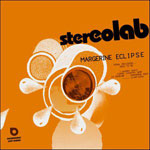
So Saturday morning and my coffee cup is full and dark and aromatic. Sure itís not as nice as the ones they serve down in Boston, but once again, what the hell. The stereo is cranked up. The CD pile WILL be reduced. In 10, 9, 8Ö
I liked Rupertís recent review article where he did that Ďwhatever happened toí thing. So whatever happened to Speedy J? I really donít know. I do, however, know what happened to me in the years since I last heard a Speedy J record. I fell out of love with electronica and techno (do they even still call it techno?). I donít know why exactly, but Iím sure it had much more to do with fashion and the face of unacceptability than anything else. The face of unacceptability being of course my own: never trendy enough to be a techno chap, I felt the withering glances from behind nifty shades and melted into the earth. Either that or it just seemed much less interesting than it once did.
The new Stereolab sounds a lot what Iíd expected too, and once again this is a cause for celebration. And whilst Margerine Eclipse (on the ĎLabs own very fine Duophonic label) makes a case for cracking out the bubbly and floating pale orange balloons through the open attic windows to fly high into the cool blue light above; whilst it follows the Stereolab bleuprint of how to sculpt delicious sounds that flicker like Dan Flavins and taste like a Battenberg cake baked in heaven, it doesnít make for very exciting music journalism. I mean, what more do you say? Itís Stereolab. And Stereolab sound like Stereolab. And Stereolab sound like magic.

More quirky eclectic euro electro from Jason Forrest, whose The Unrelenting Songs Of The 1979 Post Disco Crash (sonig) also sounds pretty much as youíd expect: a manic deconstruction of late Ď70s disco blended with a 21st Century insensibility and a penchant for fractured beats and noises that squelch and squawk like birds of paradise. This is the sound of mirror balls exploding on the dancefloor, the noise of the Glitter Band falling through a black hole, of Tom Jenkinson snogging Chic and Rupert Parkes doing the tango with ELO. MaybeÖ But whatever the hell it sounds like, it sounds exceedingly entertaining.
I had a bunch of stuff through from the Invisible Hands label recently, including an album by Clear which is supposedly something like XTC and uh, (fishes around for press release, which appears to have dissolved in the chaos of the attic) some other bands that Iím sure I liked but that in fact sound nothing like Clear at all; Clear sounding to me like just another fairly dreary indierock band and thereís not much else that needs to be said, quite frankly. Ditto the Kates, who have an EP on the same label. They at least have a song called ĎStudent Bastardsí which made me smile for the five seconds it took me to come to the conclusion that it actually sounds exactly like youíd expect a record made by student bastards to sound. And you know that ainít good.
Itís left then to Forest Giants to salvage some kind of honour for the label, and in fact In Sequence is almost good enough to erase all memory of Clear and The Kates. Itís a warm, personal kind of record, completely at odds with the forced bluster and bruising egos of its label mates. Maybe thatís not surprising, given that Forest Giantsí songwriter is Tim Rippington, and for all those of you going Ďduh, Tim who?í letís just do a speedy recap and remind ourselves that Tim is ex of the often fabulous but under-rated Beatnik Filmstars, and if we go further back we find him a one-time player in the Flatmates, and is my memory deceiving me or wasnít he also in the groovy Groove Farm? Of course this is all going back a long time into the mists of Bristolís murky late Ď80s and early Ď90s, but whatverÖ Itís in those murky depths that youíll also find fellow Forest Giant Ruth Cochrane, playing sublime bass for the Blue Aeroplanes when they were at the boparty peak of their powers (back when they also still had the genius of Richard Bell in their magnificent ranks). No surprise then that the sound of Forest Giants is one that is mature and perfectly poised; that In Sequence is a delight of low-key rock-pop with an eclectic edge. Their label mates would do well to study and learn.

Drifting out to Westchester County now, and here come The Vibration with a five track EP on BC Records. A four piece girl group who bristle with a post-punk fever, these cuts are full of bittersweet clanging guitars and a voice that caresses and grazes. Theyíve shared stages with the likes of The Blow and Rilo Kiley which should give you some kind of idea about where theyíre coming from and where theyíre going. If I was seventeen again Iíd have pictures of The Vibration tacked to my wall and Iíd be playing this EP for days. As it is I guess Iíll have to just stick with assaulting that Ďrepeatí button. File next to Sleater Kinney and Spinanes and let your heart bleed on the bedroom carpet.

The Poptones issue of Denise Jamesí solo debut was a sensation that should have been front page news. Like fellow Detroit dwellers Slumber Party, James bridged the gap between the Shangri-Las and Bessie Smith, putting soul and femme glamour into indie-rock. It was a record that was bitter and broken hearted, sorrowful and extremely sexy.
No surprise then that Iím excited by the release of a new Denise James album. The Matthew Smith produced Itís Not Enough To Love (on the Rainbow Quartz label) finds Denise more upbeat than on her debut, but no less arresting and appealing. Thereís a lush í60s aura here; some soaring Beach Boys tinged harmonies and sweet Byrdsian guitars; a soft-pop orchestration that envelopes and seduces with a dewdrop pearlessence. There is a depth here that rewards repeated playings, and thatís not something I find hard to do. Denise James is up there in my canon of great femme artists, contemporary or otherwise. Do yourself a favour and add her to yours too.
© 2004 Alistair Fitchett